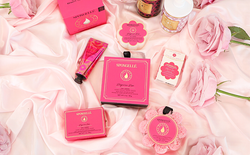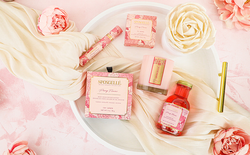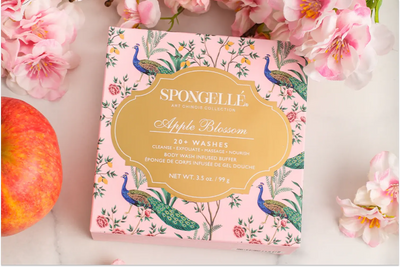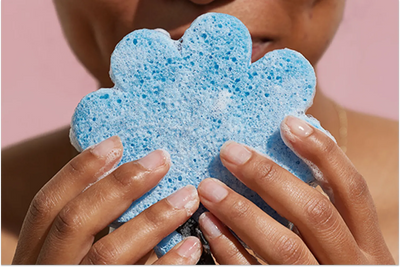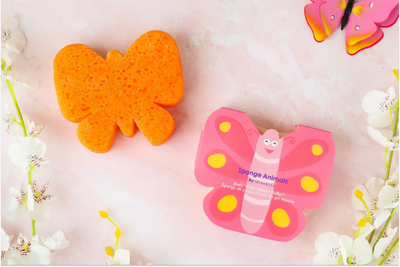A lot of people credit their gorgeous, glowing skin to their exfoliation routine, both on their faces and their bodies. That said, in most cases, people can use stronger products on their bodies because the skin is not quite as sensitive. Even those who have sensitive skin on their face can usually get away with using brushes and shower sponges on their body.
Exfoliating soap is another option. It works to break down dead skin cells and remove buildup from dirt, oil, pollution, makeup, and anything else that finds its way onto your skin. Exfoliating soap can be both depending on the ingredients included. Most skin types can tolerate exfoliating soap unless you have a specific issue that causes you to react to exfoliants. Just be careful with these because physical exfoliants that are too harsh can actually damage your skin.
No matter which type of exfoliant you use, the process is important for your skin health in order to remove dead skin and other types of buildup. This prevents skin irritation and acne and can help the skin look and feel smoother.
What Does Exfoliating Do For The Skin?
There are a lot of things that can clog our pores and build up on our skin, like dirt, oil, and makeup. Even just being outside for a short period of time can result in pollution finding its way into your skin. Over time, our skin cells die. Some will shed naturally, but some of the dead skin cells can also build up on your skin, resulting in more clogged pores.
All of this clogging can result in acne, dry and dull skin, and the inability of your skin to renew its cells and absorb skincare products. Depending on your skin type, you can either use one or the other, or both. Regardless of which type of exfoliant you use, you need to be careful and exfoliate safely.
Over-exfoliating your skin can cause a lot of issues, and can even worsen the issues you are already trying to resolve. For example, if you exfoliate your skin too much, your skin won’t have enough natural oils. It will then try and compensate for this and start to produce more oil, which can result in acne.
If you have dry skin and are trying to exfoliate the flakes off, you can have issues, too. Too much exfoliating can result in irritating the skin and drying it out even more. It can be super frustrating and tricky to find the right balance. It really will take some trial and error to figure out what works and what doesn’t (as with any skincare product). If you’ve never exfoliated before, try starting just once a week to see how your skin reacts.
What’s The Difference Between A Physical Exfoliant And A Chemical Exfoliant?
While the end goal is the same, there is a difference between physical and chemical exfoliants, both of which can appear in exfoliating products. The main difference is how they exfoliate the skin.
As long as you don’t have sensitive skin, you can experiment with both types of exfoliants. You can also use both techniques, but be sure you aren’t using two different types of exfoliants on the same day, as this can lead to irritation. Below, we break down the difference between exfoliants to help you figure out which kind you need.
Physical Exfoliants
Physical exfoliants are also known as manual exfoliants. This category includes things like washcloths, facial cleansing devices, and scrubs. These tend to work best for people with oily skin. No matter your skin type, a gentle washcloth is typically the safest physical exfoliator, but even still, you never want to apply too much pressure when physically exfoliating, as this can lead to irritation.
Chemical
This type of exfoliation is typically more aggressive, depending on the type of chemical used. For those with sensitive skin, you can definitely try chemical exfoliants, with some exceptions. Harsh and strong exfoliants are for those with normal to mature skin that is much stronger.
Two commonly used chemical exfoliants for sensitive skin are mandelic acid and lactic acid, which are used to help with rosacea and redness in the skin. You can get peels with either acid or find some skincare products that contain them. In general, many dermatologists prefer chemical exfoliation because it can be less aggressive than manual scrubbing.
Do Shower Sponges Help Exfoliate Skin?
Yes! Shower sponges do help to exfoliate the skin. It’s important to note that traditional sponges can get very dirty in a short period of time. In fact, they are often referred to as breeding grounds for bacteria by many dermatologists. This is definitely not something you want to put on your skin on a daily basis, if at all.
A great alternative to traditional loofahs and plastic shower sponges is our Spongellé body sponges and buffers. Besides the fact that we use high-quality fragrances and ingredients in all of our products, each sponge is infused with an antibacterial agent that prevents bacteria from growing, as the biggest issue with using traditional sponges is the fact that they are dirty and can grow bacteria. We get rid of this issue entirely.
You no longer have to worry about washing your sponges and wondering when it’s time to throw them away. We tell you exactly how many washes you get with each sponge, ranging from 12 to 30 uses, so you can stay on top of it. Our deliciously scented sponges stay sanitary throughout that duration and keep your skin fresh and clean.
They work as both chemical and physical exfoliants at the same time. The sponge helps to manually remove dead skin cells, dirt, and buildup, while some of our ingredients act as agents for breaking down dead skin. The result is squeaky clean skin every single time, and who wouldn’t want that?
If you’re concerned about over-exfoliating, don’t worry; we thought about that too. Our products are all designed to be three-in-one, acting as exfoliators, cleansers, and hydrating the skin as well. You will never have to worry about exfoliating too much or whether or not you’re stripping your skin. The entire time you use the sponge, your skin will be infused with hydrating ingredients.
Are The Sponges Just For Your Body?
Nope! We’ve literally thought of everything. One part of the body people tend to overlook is their feet. We have a separate product for tackling dry and dead skin on your feet. Our Pedi-Buffers are designed specifically for the tougher skin on the bottom of your feet. One side is a rougher, textured material to help scrub and remove dead skin, while the other side is soft for cleansing.
You start with the soft side to work up a lather on the skin and follow it with the textured side to remove dry and dead skin. We also have a Pedi-Buffer collection specifically for men, with different scents and different levels of exfoliation. His-and-hers spa day, here we come!
Conclusion
Exfoliating soap works by removing buildup on the skin, and there are two main kinds of exfoliation: chemical and physical.
Chemical exfoliants use various acids to help break down the dead skin cells and remove any buildup (such as from skincare products or makeup). If you’re looking for a chemical exfoliant, you might consider including lactic acid or mandelic acid in your routine.
That said, many chemical exfoliants should only be used by a dermatologist and can be found in specialty peels and facials because chemical exfoliants can be extremely strong and powerful. Without proper usage, they can damage the skin.
If you have extremely sensitive skin, it is better to start out with a chemical exfoliant, noting that you should be very careful and use only gentle products. If you have normal to mature skin, you can start out by using chemical exfoliants either in your face wash, serum, or with a peel at the dermatologist.
Physical exfoliants help to manually remove buildup. Some examples include washcloths and shower sponges. Facial scrubs can fall into both categories, depending on their ingredients.
Our Spongellé shower sponges help to remove all types of buildup while keeping the skin hydrated. We have collections geared towards both men and women, and we have another line of buffers for your feet as well. When it comes to safe, fun exfoliation, Spongellé has you covered.
Sources:
https://www.aad.org/public/everyday-care/skin-care-secrets/routine/safely-exfoliate-at-home
https://www.self.com/story/skin-exfoliation-types
https://hellogiggles.com/beauty/skin/chemical-vs-physical-exfoliants/


